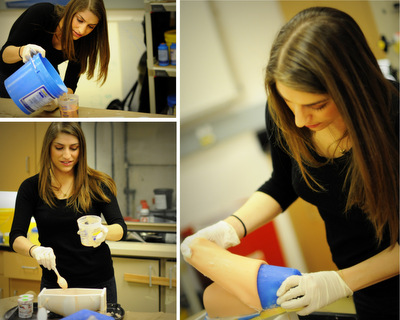
The attending handed Alicia Peterson, MD, a fourth-year resident in emergency medicine, a scalpel.
The patient had a swollen airway and Peterson knew she had to perform a cricothyrotomy, or an emergency incision into the larynx to open the passage. It’s a rare procedure, but one she had practiced several times on a model created by Northwestern’s Innovation Lab.
“It was a blur. My hands took over. I just knew what to do,” she said about the incident. “I knew where the landmarks were and the procedure ran smoothly. I wasn’t nervous or shaky like I would have been if hadn’t had the training from the simulation model.”
As part of her residency, Peterson practices procedures twice a month in the Innovation Lab within the Simulation Technology and Immersive Learning Center. The lab develops medical training devices using state-of-the-art materials and techniques, including modern polymers, 3-D printing, and Computer-Aided Design (CAD), with the goal of improving medical education.
An experience like Peterson’s validates the importance of training on models. Innovation Lab Manager Lanty O’Connor believes one day procedures will be practiced first on simulators.
“The medical paradigm has always been see one, do one, teach one,” he said. “Instead the model should be training until mastery, becoming an expert in that procedure before moving on. The Innovation Lab allows for that kind of training.”
In addition to the cricothyrotomy simulator, researchers in the lab have collaborated with faculty to create everything from pediatric radiology simulators to neonatal chest tube simulators to plastic surgery models for facial lacerations.
One of these researchers, Amy Halverson, MD, associate professor in surgical oncology, collaborated with the lab to develop plastic surgery models for facial lacerations. Halverson will send the models to rural doctors with educational materials to practice suturing techniques. The physicians will send the models back to Northwestern for evaluation. Currently, plastic surgeons are testing the trainers for reliability.
Lab Designer Lauren Davis recently had two papers accepted into medical journals highlighting the work she’s done in the lab.
Davis worked during the summer of 2011 with June Robinson, MD, research professor in dermatology, to improve a melanoma simulation model. A paper on the impact the model had on third-year medical students who were assessing the disease was accepted to JAMA Dermatology 2013.
“Physicians come to us with a problem and we collaborate to design a product to help them teach better,” Davis said. “When I started, some of the models were just Tupperware containers with a few slits. A lot of what I have done has been adjusting existing models and coming up with new ideas and models.”
Davis also co-authored a paper with Katherine Barsness, MD, assistant professor in surgery. The paper, accepted into the Journal of Pediatric Surgery, describes her esophagus repair simulation model. The model recreates the procedure performed by pediatric surgeons on infants to repair a disconnect in the upper and lower esophagus, preventing the normal passage of food from the mouth to the stomach.
“It is really cool to watch people use the models,” Davis said. “When you create surgical simulators, you are impacting someone’s life. My work has a direct impact on the residents and fellows that learn on our models. I have the potential to make a difference in medicine and affect patients. When that person tries a procedure on a person then it may go smoother and have fewer complications.”






